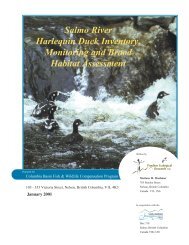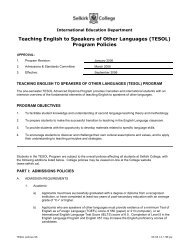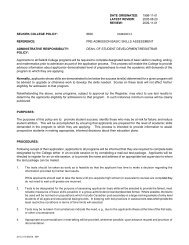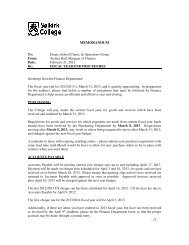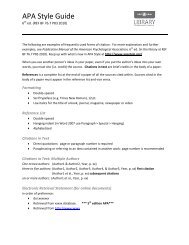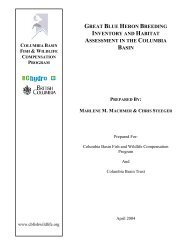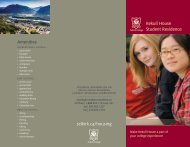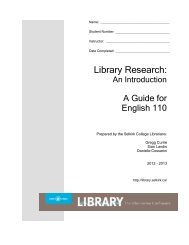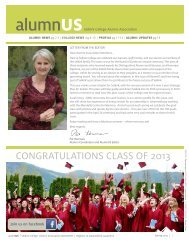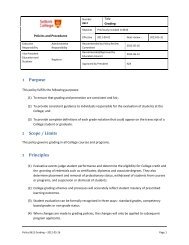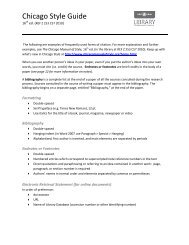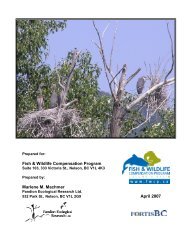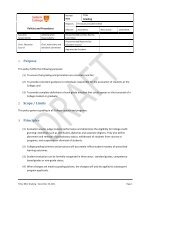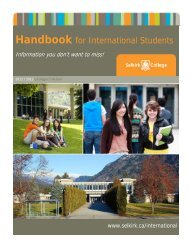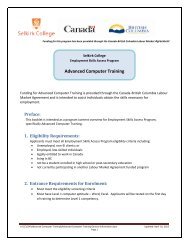selk irk.ca - Selkirk College
selk irk.ca - Selkirk College
selk irk.ca - Selkirk College
You also want an ePaper? Increase the reach of your titles
YUMPU automatically turns print PDFs into web optimized ePapers that Google loves.
Forest Technology<br />
chance access planning, assessing terrain/slope<br />
stability and potential environmental impacts<br />
of road construction, route corridor reconnaissance,<br />
road lo<strong>ca</strong>tion techniques, road standards,<br />
survey and design, road construction methods,<br />
bridges and drainage structures, road management<br />
strategies as well as the appli<strong>ca</strong>ble legislation,<br />
permits and methods of estimating construction<br />
costs. The course also reviews basic forest<br />
hydrology principles and the effects that resource<br />
road construction and/or forest harvesting might<br />
have on the hydrology of a forested site or small<br />
watershed.<br />
Prerequisites<br />
All first year courses.<br />
FOR 265 Forest Measurements<br />
A study of the policies and procedures used for<br />
timber cruising, log s<strong>ca</strong>ling and waste and residue<br />
assessment in British Columbia. Using timber<br />
valuation as a fo<strong>ca</strong>l point, emphasis is placed<br />
on field data collection techniques, sampling<br />
methods, statistics and data compilation. The<br />
opportunities associated with forest <strong>ca</strong>rbon offset<br />
projects and woody biomass utilization will be<br />
explored. The roles of the Ministry of Forests,<br />
Lands and Natural Resource Operations and<br />
the forest industry are also explored in class and<br />
through onsite tours of lo<strong>ca</strong>l forest manufacturers.<br />
Prerequisites<br />
All first year courses.<br />
FOR 271 Applied Ecology and<br />
Range Management<br />
This course provides enhanced and new skills<br />
related to the successful management of forest<br />
ecosystems. The course emphasis is on applied<br />
ecologi<strong>ca</strong>l principles, data collection and analysis,<br />
and the applied use of relevant legislation and<br />
guidebooks. Subject matter includes studies of<br />
lands<strong>ca</strong>pe and stand level ecology, soils and terrain<br />
assessment, riparian management areas, vegetation<br />
complexes, watersheds, and biodiversity. All<br />
subject areas are covered in the classroom and in<br />
the field.<br />
FOR 274 Forest Health<br />
This course consists of an extensive field<br />
examination of a wide range of prominent forest<br />
health agents and conditions. This includes field<br />
recognition, biology, ecologi<strong>ca</strong>l role and forest<br />
management impli<strong>ca</strong>tions of various forest insects,<br />
fungi and abiotic agents. Other topics include<br />
the recognition and management of invasive<br />
weed species, assessment of forest health agents in<br />
conjunction with silviculture surveys and harvesting<br />
prescriptions, management of root diseases<br />
and assessment of bark beetle occurrences.<br />
FOR 280 Applied Research Project<br />
The objective of this course is for each student<br />
to complete an applied research project that has<br />
both a field-based data collection component,<br />
and a literature-based research component.<br />
Although each student may choose a topic of<br />
personal interest within the field forest resource<br />
management, the project must be approved by<br />
the advising instructor and be relevant within<br />
the forest resource industry. Students will receive<br />
instruction on how to conduct field research and<br />
produce a techni<strong>ca</strong>l report. Students will select a<br />
research topic and faculty advisor, write a research<br />
proposal, produce a techni<strong>ca</strong>l report and give a<br />
presentation on their project at the annual SEG<br />
conference at the end of the winter semester. The<br />
techni<strong>ca</strong>l report research reopaper must conform<br />
to either the prescribed format provided, or a format<br />
agreed upon with the supervising instructor.<br />
This course spans the fall and winter semesters.<br />
Students will receive a “course in progree” (CIP)<br />
grade in the fall until the research is completed in<br />
the winter semester.<br />
ENVR 250 Aboriginal Peoples and<br />
Environmental Management<br />
This course introduces students to the Aboriginal<br />
peoples of Canada and their role in resource<br />
management. Topics will include Aboriginal<br />
cultures, languages and governance, history since<br />
contact and the Indian Act, Aboriginal rights and<br />
associated landmark court <strong>ca</strong>ses, BC treaty process<br />
and interim agreements, the Heritage Conservation<br />
Act, and working effectively with Aboriginal<br />
peoples. In addition, from a Traditional Ecologi<strong>ca</strong>l<br />
Knowledge perspective, learners will engage in<br />
team-lead projects involving ecosystem-based<br />
management, sustainable management, and<br />
environmental management systems. This course<br />
involves a team-based model of learning and<br />
active participation in scenarios and round table<br />
discussions.<br />
ENVR 290 Computer Appli<strong>ca</strong>tions<br />
Resource Management in British Columbia has<br />
become more complex and so the need for clear<br />
presentation of ideas, plans, and strategies is more<br />
important than ever before. The content of ENVR<br />
290 will address software used for the assembly,<br />
display and presentation of renewable resource<br />
information. Preparing submission quality<br />
maps using Softree and ArcGIS software will be<br />
emphasized.<br />
FOR 200 Field Trip Study<br />
In the spring of the fourth semester, second year<br />
students will participate in a field trip to study<br />
away from the Castlegar Campus. The field trip<br />
provides an opportunity for students to see, firsthand,<br />
current management practices, ecosystems<br />
and resource management issues in other regions<br />
of the province. Students will be actively involved<br />
in trip planning and will be presented with<br />
opportunities to develop communi<strong>ca</strong>tion skills,<br />
job finding skills and professionalism.<br />
This course is available only to students registered<br />
in the second year of the Forestry program.<br />
FOR 251 Silviculture II<br />
This course is a continuation of Forestry 250.<br />
Treatments studied include seed and cone<br />
collection, and stand tending (juvenile spacing,<br />
commercial thinning, pruning, brushing and<br />
weeding, and fertilization) and selection of<br />
appropriate silviculture systems and development<br />
of silviculture and stand management prescriptions.<br />
All topics are studied in the classroom and<br />
in the field.<br />
Prerequisites<br />
FOR 250 and Fall Semester second year courses.<br />
FOR 253 Forest Policy and<br />
Resource Management<br />
This course serves as an introduction to the<br />
prominent legislation which directs forest<br />
management practices and forest tenures in British<br />
Columbia. Topics include: current issues, administration<br />
and ownership, access to legislation,<br />
introduction to forest tenures, review of main<br />
legislation, decision-making and financial analysis,<br />
rsource sustainability, and allowable annual cut<br />
determination. As well this course explores the<br />
Acts and Regulations affecting forest management<br />
in BC, the rights to harvest timber, the tenure<br />
system, appraisals and value of timber, elements<br />
of the Forest and Range Practice Act, private land<br />
management, and resource managment ethics.<br />
FOR 261 Forest Harvesting<br />
An in-depth examination of total chance harvest<br />
planning; harvest systems including, ground, <strong>ca</strong>ble<br />
and aerial; layout considerations; log transport;<br />
and the environmental impacts of harvesting<br />
operations.<br />
Prerequisites<br />
FOR 260.<br />
FOR 275 Forest Pest Management<br />
This winter semester course expands on materials<br />
presented in the Forest Health Management<br />
Course.Emphasis is placed on the biology,<br />
ecologi<strong>ca</strong>l role and management strategies for<br />
selected insect defoliators,bark beetles, wood and<br />
boring insects, stem and foliage diseases, dwarf<br />
mistletoes, stem de<strong>ca</strong>ys and exotic species. The<br />
class also examines the assessment of danger trees,<br />
agents found in the forest nurseries, cone and<br />
seed damage and natural population regulation<br />
mechanisms.<br />
178 Selk<strong>irk</strong> <strong>College</strong> 12/13 School of Environment and Geomatics



